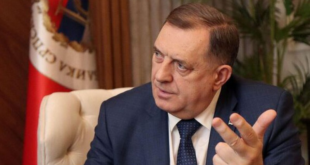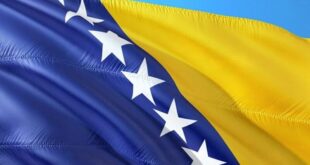As far as the international community is concerned, the outcome of Bosnia-Herzegovina’s 3 October general elections will determine whether the country moves forward along its EU path or remains stuck in political deadlock and ethnic animosity, Anes Alic writes for ISN Security Watch.
Bosnia is, in all aspects, lagging behind every other country in the region, particularly in terms of progress towards EU integration.
The most recent debacle has been Bosnia’s failure to win a visa-free regime from the EU for its citizens. Last July, the EU rejected Bosnia’s visa liberalization bid, promising to review the case again once the necessary technical requirements had been fulfilled. With only one requirement left to be fulfilled – the appointment of a new head of the state anti-corruption agency – Bosnia again dragged its feet, waiting until one day before the deadline to bring its vacationing lawmakers together to resolve the issue. And even now, it remains unclear when Bosnia will actually be granted visa liberalization.
The final requirement was fulfilled only one day before the European Parliament’s (EP) Committee for Civil Liberties, Justice and Home Affairs met to discuss whether Bosnia has upheld its end of the bargain, and the official report on this meeting is not expected to be completed and released until late this month. Bosnians are holding out hope that they could enjoy visa-free travel by the end of the year.
A very forgiving electorate
Throughout all of this, the international community appears to be hoping that Bosnia’s ethno-nationalist authorities will be punished by their voters for failing to secure visa liberalization before the October elections. But such punishment is not likely to be forthcoming.
Srdjan Blagovcanin, executive director of the Bosnian branch of Transparency International (TI), told ISN Security Watch that the current government is the worst since the war.
“The ruling parties promised constitutional changes, Euro-Atlantic integration, administrative reform, a more successful fight against crime and corruption, completion of the refugee return process, a decrease in public spending, economic growth and development, educational reform, etc. Not only have they not fulfilled any of these promises, but they have even strongly fought against them,” Blagovcanin said.
The reality is that since the last parliamentary and presidential elections in 2006, Bosnia’s governing parties have failed to conduct a single reform. Though working toward EU integration was a major campaign promise in the previous election, candidates will not be standing before their voters with any embarrassment.
Worst government yet
Since the end of the war, with the exception of two years of rule by moderate parties, Bosnia and Herzegovina has been governed by officials who use ethnic tensions to mobilize their ethnically-based constituencies to support them.
Since the 2006 elections, the Bosnian government has passed 90 laws out of 370 they planned (a dozen of these had been prepared by the previous government) while the rest were passed for all intents and purposes by the international community. In the same period, Bosnian Parliament adopted 150 out of 500 planned laws and regulations.
Studies conducted by local NGOs show that the five parties in power implemented 18 out of 367 of their election promises from 2006. The above-mentioned visa-free regime was one a 2006 election campaign promise, with current governing parties promising citizens a visa-free regime by 2008 at the latest.
In mid-August, the Sarajevo-based Citizen Association “Why Not?” presented its analysis of 2006 pre-election promises. Darko Brkan, president of the association, told ISN Security Watch that the study showed that the ruling parties entirely betrayed voter trust.
“Aside from fulfilling only some 5 percent of their election promises, only one quarter have been partially realized, while 251 have been completely neglected. Furthermore, five parties made 17 promises that would be impossible to fulfill, were not in their jurisdiction to fulfill, or had already been fulfilled,” Brkan said.
Brkan said he hoped that Bosnian voters would recognize the ruling parties’ failure, and has launched a website monitoring the realization of election promises, with the aim of increasing voter awareness ahead of October.
More failures and missed opportunities
The European Court of Human Rights ruled that Bosnia must change its constitution to end discrimination against minorities before the October election. Several rounds of EU-US initiated constitutional reform talks failed to that end, and the elections are going ahead despite this.
Bosnia also missed the 1 September deadline for fulfilling its last requirement (the registration of all military equipment in the country) for NATO’s Membership Action Plan (MAP), and as such, membership has been postponed for another year.
Bosnia’s EU membership is also in limbo, and Brussels is clearly not willing to make the same mistake it made with Bulgaria – accepting the membership application of a country that is not yet prepared to fight corruption or to move on reforms that would create political and economic stability.
Fear trumps disillusionment
While the international community is hoping that the visa-liberalization failure will prompt a change of heart among voters and thus a change of leadership, this is not likely to happen, at least not in October.
The popularity of ethno-nationalist parties here has never been measured by achievements, rather by ethnic rhetoric – perceived notions of ethnic protection and security are prioritized above EU integration, reform and economic stability.
The ruling ethnic leaders began heightening their rhetoric months ago, well before the official election campaign season, with Bosnian Serbs threatening secession, Bosnian Croats calling for a further division of the country along ethnic lines, and Bosniaks (Bosnian Muslims) insisting on greater centralization. And it is this ethnic tension that fills the polling stations.
That said, according to an opinion poll conducted last year by the Gallup Balkan Monitor, more than 60 percent of Bosnian Serbs said they did not trust the government of Bosnia’s Serb-dominated Republika Srpska entity, while 75 percent of citizens in the Bosniak and Bosnian Croat-dominated Federation entity said they did not trust the government they voted for. In the same poll, every second citizen said they did not trust any of the country’s political parties.
An early August poll conducted by the Bosnian office of the National Democratic Institute (NDI) shows that 87 percent of Bosnian citizens feel that the country is being led in the wrong direction. Only 6 percent are confident in the ability of their political leaders to resolve the most pressing challenges of unemployment, economic development and EU integration.
All these numbers indicate that Bosnian citizens are ready for a revolution. But these sentiments tend to revert on election day, when ethno-nationalist rhetoric tends to prevail and the moderate opposition forces show their weak hands.
Opposition weaker than ever
Some 8,000 candidates plan to run in the 3 October general elections, representing 50 parties and coalitions, along with 13 independents. However, there are no new faces or programs on the scene, and most of the candidates and minor parties are simply breakaways from the major parties.
Furthermore, the opposition parties on all three sides have never been weaker. Aside from a few parties that can count on votes from mostly urban areas, most of the opposition parties cannot, at this point, win even a minimum of seats in parliament. And among those who can, there is little chance of forming a like-minded coalition.
Due the lack of new choices, it is expected that the October elections will be marked with a low voter turnout among the youth and urban electorate.
Source: isn.ethz.ch
 Eurasia Press & News
Eurasia Press & News



